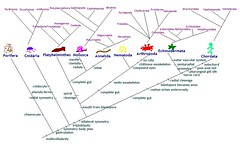Penmachine
04 May 2007
Perhaps the best explanation of science I've ever seen
 It's really long, but this court transcript (no really!) (via Pharyngula) provides a remarkably clear explanation, early on, of the processes the scientific community has developed over the past several hundred years to get better at figuring what's going on in the universe.
It's really long, but this court transcript (no really!) (via Pharyngula) provides a remarkably clear explanation, early on, of the processes the scientific community has developed over the past several hundred years to get better at figuring what's going on in the universe.
Later on, Dr. Kevin Padian, the paleontologist witness in question, goes into more detail about fossils, evolutionary biology, problems with proposals about intelligent design, and so on, with similar verve. I recommend you read the whole thing, but if you're short on time, just the Qualifications section will do.
Some quotes from that part:
I think the term "theory" [...] has to be looked at the way scientists consider it. A theory is not just something that we think of in the middle of the night after too much coffee and not enough sleep. That's an idea. And if you have a hypothesis, it's something that's a testable proposition, you can actually find some evidence that will help you to weigh it one way or the other.
A theory, in science [...] means a very large body of information that's withstood a lot of testing. It probably consists of a number of different hypotheses, many different lines of evidence. And it's something that is very difficult to slay with an ugly fact, as Huxley once put it, because it's just a complex body of work that's been worked on through time.
Gravitation is a theory that's unlikely to be falsified even if we saw something fall up. It would make us wonder, but we'd try to figure out what was going on there rather than just immediately dismiss gravitation.
[...]
For all the world, it looks like, you know, to us normal people, that the sun goes around the Earth. And for most people, it wouldn't make a difference whether the sun went around the Earth or it went around the moon, as Sherlock Holmes famously said to Watson. But when the renaissance scholars understood, found out that, in fact, the sun does not go around the Earth but the Earth and the planets go around the sun, it changed the way we look at the whole natural world in a very important and fundamental way.
And so part of the process of science is to discover things that will make a difference to our understanding of the natural world and not simply to reinforce appearances that are very difficult to test in an objective or testable sense.
And I really like this one:
If you are looking for direct ancestors, if you insist on an unbroken stream of intermediate fossils to document a case, I'm afraid that that's going to be difficult to get under any circumstances, but it's also equally impossible for the historical record of humans.
If we had to come up with evidence of every one of our direct linear or collateral ancestors and know everything about them, it would be impossible, yet we don't question the parentage of our friends and neighbors because they can't do that.
[...]
That seems like a very difficult standard of evidence to live up to. We can't do that with humans most of the time, and I'd be surprised if we could do it with animals that are 350, 400 million years old.
I just stayed up till almost three in the morning reading the whole thing, even in my chemo-sozzled state (it helps that I slept six hours earlier this evening). I do have to say that his slides could have used some work, but the strength of the words and ideas did their job, which was the point. Overall, it's a remarkable piece of written work—even more remarkable for being a transcript of courtroom speech.
Labels: biology, creationism, evolution, intelligentdesign, naturalselection, paleontology, science